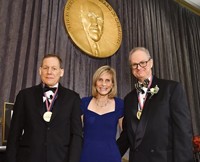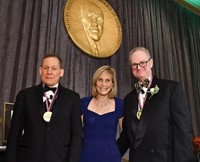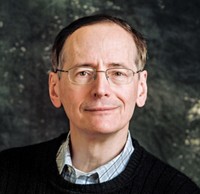Advertisement
Grab your lab coat. Let's get started
Welcome!
Welcome!
Create an account below to get 6 C&EN articles per month, receive newsletters and more - all free.
It seems this is your first time logging in online. Please enter the following information to continue.
As an ACS member you automatically get access to this site. All we need is few more details to create your reading experience.
Not you? Sign in with a different account.
Not you? Sign in with a different account.
ERROR 1
ERROR 1
ERROR 2
ERROR 2
ERROR 2
ERROR 2
ERROR 2
Password and Confirm password must match.
If you have an ACS member number, please enter it here so we can link this account to your membership. (optional)
ERROR 2
ACS values your privacy. By submitting your information, you are gaining access to C&EN and subscribing to our weekly newsletter. We use the information you provide to make your reading experience better, and we will never sell your data to third party members.
Awards
Tobin Marks wins the 2017 Priestley Medal
Organometallic pioneer honored for materials and catalysis research
by Elizabeth K. Wilson
June 13, 2016
It’s hard to summarize the work of Tobin J. Marks. Even his title at Northwestern University, where he has worked since 1970, suggests he’s got a lot of irons in the fire: the Charles E. and Emma H. Morrison Professor of Chemistry, Professor of Materials Science & Engineering, and the Vladimir N. Ipatieff Professor of Catalytic Chemistry.
The breadth, quantity, and quality of Marks’s work has long been recognized by his peers. And in 2017, Marks will receive the Priestley Medal, the American Chemical Society’s highest honor, for “pioneering research in catalytic polymerization, organometallic chemistry, organic opto-electronic materials, and electronically functional metal oxides.”
“I am deeply honored to receive this most important recognition from the American Chemical Society, and likewise am deeply honored to join the ranks of all the previous Priestley medalists,” Marks says.
For nearly 50 years, Marks has been carrying out cutting-edge work, including the development of organic photonics and olefin-polymerization techniques that led to processes that produce more environmentally friendly plastics.
Marks has many standout achievements, including the development of flexible electronic materials that can be used for organic light-emitting diodes and solar cells. He cofounded the company Polyera to commercialize these materials.
Marks’s group has also devised methods for producing classes of oxide thin films, leading to transparent and energy-efficient conducting materials.

Through the years, Marks has garnered dozens of awards, including the U.S. National Medal of Science in 2005, the Arthur C. Cope Senior Scholar Award in Organic Chemistry in 2011, and the Gabor A. Somorjai Award for Creative Research in Catalysis in 2013.
He’s published more than 1,100 papers, has more than 230 patents, and has served as an editor for Organometallics for 25 years.
Marks is “a true giant in the field of chemistry,” says Richard N. Zare, chemistry professor at Stanford University. “I believe his research has had a major impact in important areas of contemporary materials chemical science.”
ACS Executive Director and CEO Tom Connelly says Marks “truly embodies the achievements of a Priestley Medalist.”
Connelly notes than in addition to his pioneering work in chemistry, Marks has served as a journal editor, mentor, and colleague. “He has influenced and inspired countless students and chemists throughout his career,” Connelly adds.
But perhaps the greatest insight into Marks’s creative genius and success comes from Somorjai, chemistry professor at the University of California, Berkeley, and longtime collaborator of Marks: “We both spend two weeks on Maui between Christmas and New Year’s, and we work, drink, and eat undisturbed—not necessarily in that order.”






Join the conversation
Contact the reporter
Submit a Letter to the Editor for publication
Engage with us on Twitter